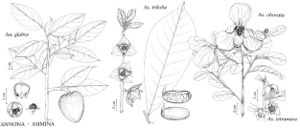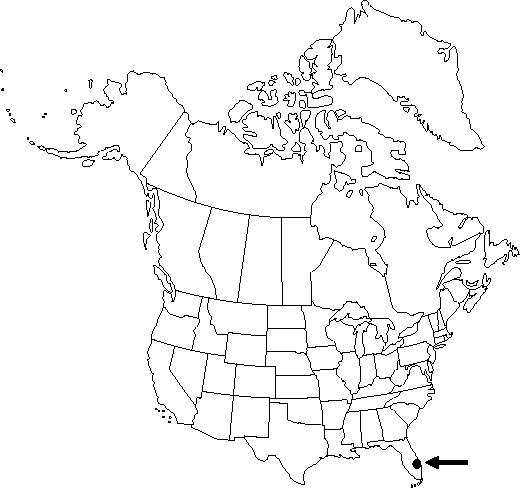Asimina tetramera
Torreya 26: 56. 1926.
Shrubs, 1-3 m. Branches 1-several from base, nearly erect to arching; new shoots redbrown to tan, distally minutely red-tomentose, glabrate. Leaves: petiole 2-3 mm. Leaf-blade spreading to upswept, oblong-oblanceolate to broadly spatulate, 5-10 (-18) cm, leathery, base narrowly cuneate, margins slightly revolute, apex rounded to obtuse-angled; surfaces abaxially glabrate, adaxially glabrous. Inflorescences from axils of new shoots, solitary flowers; peduncle slender, 1-2 cm; bracteole 1, basal, lance-oblong, 5-7 mm, hairy. Flowers nodding to nearly erect, reddish, fetid; perianth (3-) 4-merous; sepals elliptic or ovate, ca. 1 cm, abaxially sparsely rusty-hairy; outer petals ascending with spreading pale tips, lanceolate to oblong-lanceolate, 2-2.5 cm, margins slightly revolute, surfaces abaxially glabrate; inner petals ovate-acute or short-acuminate, ca. 1/2 length of outer petals, fleshier than outer petals, base large, saccate, corrugate zone adaxially deep purple; pistils 3-11. Berries yellow-green, 5-9 cm. Seeds chestnut-brown, 1-2 cm. 2n=18.
Phenology: Flowering spring–summer, all year if disturbed.
Habitat: Sands of ancient coastal dunes and adjacent open-wooded hammocks, flatwoods
Elevation: 0-50 m
Discussion
Of conservation concern.
Morphologically, Asimina tetramera is much like a tall A. pygmaea in characters of flower and leaf.
Selected References
None.

